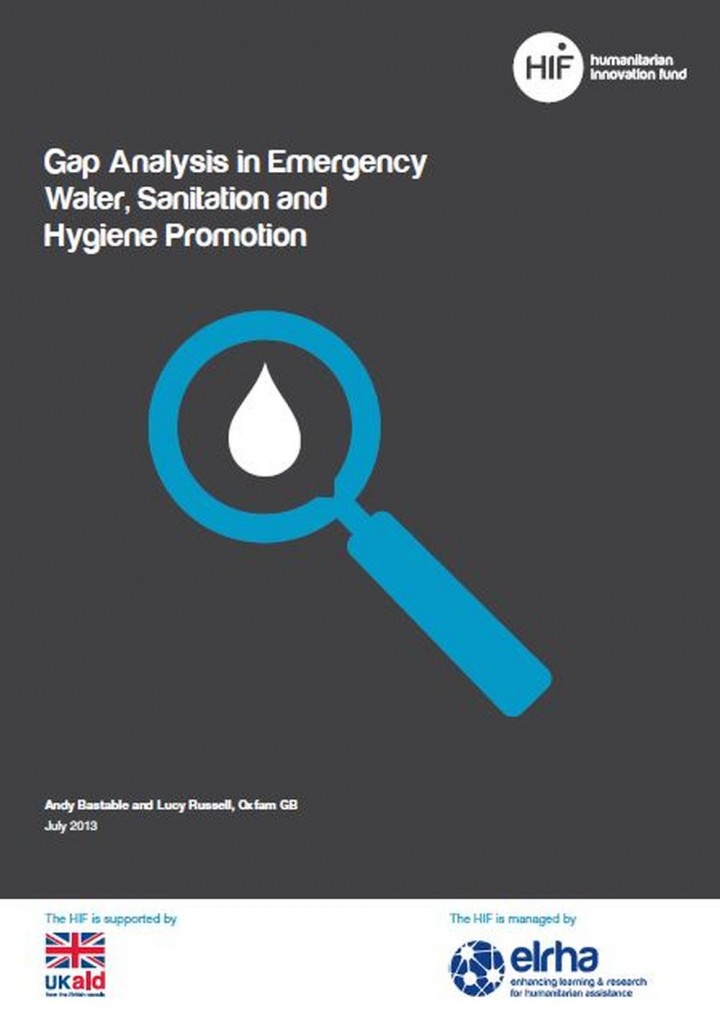
Published in: 2013
Pages: 36
Publisher:
Humanitarian Innovation Fund (HIF), London, UK
Author:
Bastable, A., Russell, L.
Uploaded by:
SuSanA Admin
Partner profile:
common upload
11494 Views
249 Downloads
The emergency Water, Sanitation and Hygiene Promotion (WASH) gap analysis project was funded by The Humanitarian Innovation Fund (HIF), a program managed by Enhancing Learning and Research for Humanitarian Assistance (ELRHA) in partnership with the Active Learning Network for Accountability and Performance in Humanitarian Action (ALNAP), and is a component of a larger initiative to identify and support innovations in emergency WASH.
The project was commissioned to identify the major challenges that require innovative solutions in humanitarian WASH. It is a targeted effort to identify different stakeholder perspectives of the gaps and spaces for innovation in emergency WASH, rather than a systematic review of the evidence around WASH programming. A total of 909 people were consulted across around 40 countries, involving individual practitioners and approximately 45 different organizations, spanning donors, the UN system and international and national NGOs Data was collected during a six month consultation period and draws on six complementary research components:
- A review of relevant literature produced over the last five years
- Structured focus group discussions with eight beneficiary groups in six countries
- Facilitated workshop discussion with WASH practitioners working at the country and sub-national level in 12 countries
- An on-line survey of humanitarian WASH practitioners
- Two facilitated sessions with Global WASH Cluster (GWC) meetings
- Consultation with five major donor organisations supporting humanitarian WASH programming and policy
Across all six components of the analysis, sanitation issues were identified as the major area with gaps and potential for innovation. The second major gap identified by four groups was hygiene issues; the country and sub country WASH sector groups and the beneficiary groups selected water as the second priority and hygiene third.
The specific issues raised have been consolidated into 57 different categories. These were then ranked according to the number of times they were mentioned in the feedback and the priority they were given in the workshops. The most significant gaps identified in emergency WASH were:
1. Latrines in locations where no pits are possible (urban, high watertable/flooding)
2. Community participation and empowerment of vulnerable groups, including monitoring and evaluation from the outset
3. Latrine emptying and desludging
4. Hygiene promotion and the importance of understanding context, including socioanthropology issues
5. Community Led Total Sanitation (CLTS) and sanitation marketing
6. Urban alternatives for excreta disposal
7. Exit strategies and sustainability issues from the outset
8. Final sewage disposal options after desludging and treatment
9. Further development of non-toilet options/ early response/mobile
10. Hand washing hardware and Promotion and sustainability (including soap) and non-soap options
11. Water Treatment, particularly bulk and point of use household filters, including cost and sustainability issues
12. The need for low-tech WASH solutions acceptable and sustainable by locals
From this list it is clear that excreta disposal issues such as latrines in areas where pits cannot be dug, desludging latrines, no-toilet options and the final treatment or disposal of the sewage are the areas in which people have identified gaps in emergency responses. Unsurprisingly, given current patterns in urban migration and the nature of recent emergency responses, urban sanitation in particular was identified as a major gap. The other major issue highlighted was weak community participation and the critical importance of designing appropriate hygiene Promotion activities for each context. Sustainability also emerged as an important issue for all WASH activities, as did the emergencydevelopment continuum, the importance of better preparation and resilience and the need for exit strategies and environmental considerations.
As to be expected, there were many other issues highlighted by various groups which were beyond the scope of this project but were nonetheless worthy of note. A major issue, for example, was coordination with local state actors and NGOs, coordination within the GWC and coordination between GWC and other Clusters. Additionally respondents mentioned funding issues, training, and preparation/prepositioning.
The next phase of this project will be to facilitate a structured innovation process to identify the strategies, methodologies and technologies that can be used to address the gaps which are not already being dealt with by other initiatives.
Bibliographic information
Bastable, A., Russell, L. (2013). Gap Analysis in Emergency Water, Sanitation and Hygiene Promotion. Humanitarian Innovation Fund (HIF), London, UK
Filter tags
Emergency and reconstruction situations (WG8) English Recommended by SuSanA (other than SuSanA publications)














